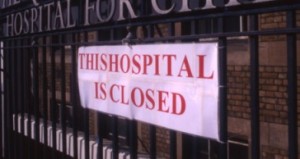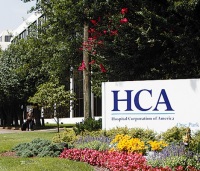July, 2014
- Molly Gamble tries to untwist the knife, “perhaps we don’t need to close hospitals.”
Last week we wrote about the CEO of Cleveland Clinic, Dr. Toby Cosgrove, championing the closure of hospitals. His cheerleader Molly Gamble is now stepping back from those comments after Alan Sager, PhD schooled her with facts. What's good for Cleveland Clinic isn't necessarily good for Healthcare. Molly, how does eating your words taste?
- Forbes: 10 Essential Selling Principles Most Salespeople Get Wrong
- Higher Mammography Screening Costs Without a predictable Clinical Benefit: the Case of digital Mammography
"Money directed at technologies not shown to have meaningful clinical benefit beyond the conventional technology result in wasted health care dollars that may have been better spent on care with demonstrated evidence for improving health. Tomosynthesis is the newest breast cancer screening technology rapidly diffusing into community practice with minimal comparative effectiveness evidence that the benefits of the new technology outperform digital mammography in a clinically important way."
- 500 People who are Centers of Influence and Thought Leaders in Healthcare – do salespeople know them?
Now more than ever being known by the thought leaders and centers of influence in healthcare is mission critical for success in sales. Under ACA hospitals are consolidating, private practices are diminishing and corporate buying is the norm. Here are 500 people to know in healthcare. These physicians, C-suite executives, policymakers and others have displayed dedication to improving the healthcare industry. In varied ways, each of these individuals has influenced and continues to shape healthcare in the United States.
- Varian Medical seeks to revolutionize oncology with developers
- OEMs Benefit from Accelerating M&A Activity in Medtech Outsourcing
Growth and profits are expected from the Medical Device Industry and investors are rushing in. Consolidation is seen as a positive trend.
- CHI seeks integration in all directions, including insurance
Very interesting insight into how Multi-Hospital systems think about markets, expansion and broad integration of their business, including delivering insurance. CEO Kevin Lofton, who runs the $11.3 billion, 74-hospital system of Catholic Health Initiatives, explains the strategic thinking behind CHI's recent acquisitions.
- 15 Hospital Urgent Care Operators Added Clinics So Far in 2014
Halfway through 2014, healthcare's urgent care market has continued its steady growth. As of July 1, 15 hospital urgent care operators added a total of 45 clinics to their portfolios this year through transactions or opening new clinics, according to data from Merchant Medicine.
- Motley Fool says ACA’s Medical Device Tax hasn’t negatively impacted our business
Fool and amuse might be the most appropriate words in Motley Fool's article on ACA's tax on medical equipment manufacturers. The article points out that equipment sold overseas isn't affected and that volumes have not increased as expected to offset this cost. However the Fool insists that the impact has still been marginal. This analysis ignores the flood of companies that have moved their operations overseas, such as GE and Medtronics. The article ignores decreased sales, lower R&D and the tens of thousands of layoffs (Stryker to name just one) that have occurred. Stocks are up but this kind of flawed analysis will be used by politicians to extort more money from an already beleaguered industry.
- Real-time locating systems (RTLS) in healthcare: a condensed primer
- If you can help hospitals and phsycian collaborate you can sell more
- Renowned Palliative Care Expert Joins Providence Health & Services
Ira Byock, M.D., to launch the new Providence Institute for Human Caring
- HCA is doing well: $904 million in pretax income on $9.2 billion in revenue
- 10 of the Biggest Rivalries tells us a lot about Healthcare under ACA
Carolinas HealthCare System vs. Novant Health (Charlotte, N.C.)
Cerner vs. Epic
Cleveland Clinic vs. Mayo Clinic (National)
Community Health Systems vs. HCA (National)
Duke Medicine vs. UNC Healthcare (Raleigh-Durham, N.C.)
Highmark/West Penn Allegheny vs. UPMC (Pittsburgh)
Houston Methodist vs. Memorial Hermann vs. St. Luke's Health (Houston)
Kaiser Permanente vs. Sutter Health (Northern California)
NorthShore University HealthSystem vs. Northwestern Medicine (Chicago)
Saint Alphonsus Health System vs. St. Luke's Health System/Treasure Valley Hospital (Boise, Idaho)
- Analytics is gold – this is where the spend is
Come and listen to a story about a man named Healthcare
A poor mountaineer, barely kept his family fed,
Then one day he was shootin at some food,
And up through the ground came a bubblin crude.
Analytics that is, IT gold, CMS tea.
- Tenet and Humana sign new multi-year national agreement
Tenet currently has 12 ACOs, covering more than 330,000 lives in nine states. Humana covers one million members cared for by 33,000 primary care physicians in more than 900 accountable care relationships across 40 states.
- Tips for Hospitals buying IT software and services
The costs of a failed IT implementation are huge. Typically a buyer can only recoup the cost of the software. Unrealized expectations, ROIs that resemble fiction instead of fact, and the monumental task (not to mention cost) of redoing a HIS, EHR or any other IT change don't get compensated. Here are tips that hospitals can use to protect themselves and sellers should know in order to sell successfully.
- ACA playbook for hospital CEOs
- The Radiologist’s Value: Measuring the Immeasurable?
Radiologists need to be proactive in demonstrating their value in improving clinical outcomes now that CMS is adjusting payments based on quality and not volume. “In 2013, CMS started implementing the value modifier by looking at quality and cost measures and getting composite scores in each of those areas, said Judy Burleson, senior advisor on quality metrics at the American College of Radiology (ACR). Quality is on one axis, cost on the other, with low, average and high rankings for each. The score determines the potential for positive, negative or zero impact on reimbursement for Part B services. “If you’re low cost and high quality, you’d be in the upper spectrum,” she said. The physician’s performance report is compared to other physicians reporting the same measures. “
- Sanford Health offers insights into how hospitals expand and buy technology
In order for technology to be purchased it must align with the new goals of healthcare, in other words help on issues that impact reimbursement, such as Patient satisfaction, wait times, clinical efficacy. Technology like Real-time locating systems (RTLS) not normally thought of in clinical settings are now an integral part of planning expansion and new facility development.
- What creates satisified customers?
- M*Modal To Emerge From Ch. 11 With $350M Less Debt
- Digital mammography costlier, shows no detection-rate advantages: study
- How is Seattle doing with the impact of ACA?
- CVS Caremark continues to expand its healthcare business
- The State of the EHR Market
The EHR market succinctly described – size, market, players.
Five years after ACA’s passage billions of dollars has been poured into the transition to electronic health records. CMS has paid out more than $14.6 billion to hospitals and health systems for the use of EHRs. The EHR market is expected to reach $9.3 billion annually by the end of 2015.
However a once-crowded field of vendors has narrowed significantly. “At the end of 2013, 10 EHR vendors accounted for about 90 percent of the hospital EHR market, based on meaningful use attestation data from CMS: Epic, MEDITECH, CPSI, Cerner, McKesson, Healthland, Siemens, Healthcare Management Systems, Allscripts and NextGen Healthcare.”
Only three, Epic, Cerner and MEDITECH, have more than half of the acute-care EHR market and they are the only companies having experienced market growth in 2013.
- Does California want to bankrupt every healthcare provider in the state?
A $10 Billion dollar fine says yes. That’s Billion with a B. Although the courts rejected it the Insurance commissioner Dave Jones still wants his $173 million dollar piece of flesh from UnitedHealth Group.
- No More Business As Usual for MedTech Firms in 2014
Medical Device Manufacturers are seeing revenue from equipment sales decline. Some are entering the business of providing healthcare. Others are finding ways of sharing risk with hospitals that are being paid on outcomes instead of volume. Still others are expanding their offerings in service, consulting, and medical outsourced management. Whatever method used one thing si definite - new revenue models and new business models are required to survive under ACA. In other words innovate or die.
- RFID and RTLS (Real Time Locating systems) are becoming big business in Healthcare
RTLS has the potential to save institutions money: Whereas some hospitals used to purchase up to three times the amount of equipment that they needed, just because they had a hard time locating it, effectively implemented RTLS can reduce the need for redundant assets. In 2011, it was reported that 95 percent of organizations that had implemented RTLS had seen a return on investment.
- Philips Healthcare commited to third-party service and xray tubes, CEO for their Dunlee division leaves




